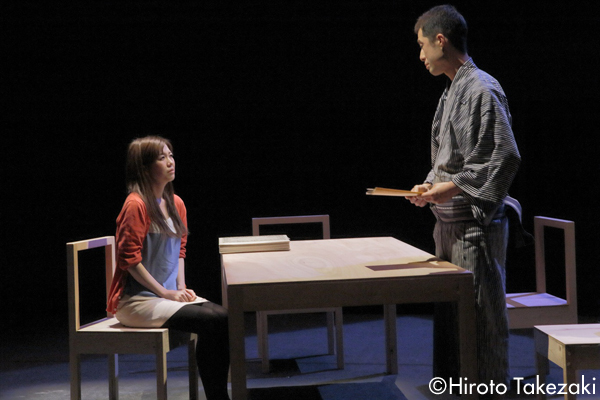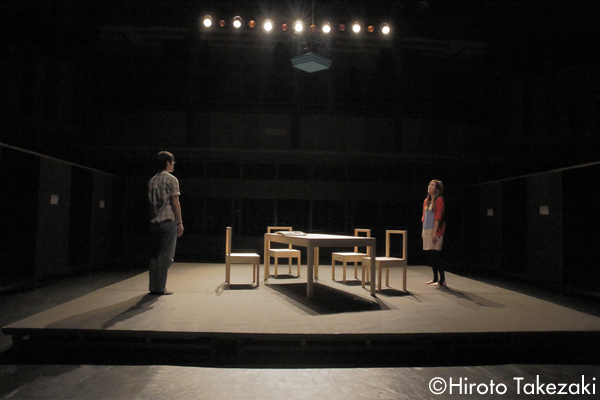The Kurata family lives in a village deep in the hills of Kyoto Prefecture. On the dinning table, the youngest daughter, Kaori is looking at an album of photographs. Seventeen years earlier, there had been seven in the family, with the three children, their parents and their grandmother and grandfather. The last photograph of the entire family together around the dinner table brings back memories.
Kaori narrates a short depiction of the family as it was.
The day that photograph was taken their grandfather died of a heart attack. After that, Kaori’s elder brother, Yukihiko, who was a high school student at the time, committed suicide. Six months after that, her father, Masao, crushed by the shock of his son’s death, suddenly disappeared. Several years later, the second son of the family, Manabu, and Kaori went off to university, after which their grandmother died, leaving their mother, Mikie, living alone in the family home.
Home now for the summer Obon festival, Kaori her brother Manabu had been looking at the album.
At their home now there is also a handsome young man named Unosawa. In fact, he is going to be their mother’s new husband, and the two are planning to move to Hawaii and a new home.
The scene changes to a summer day that might have been if Yukihiko had not committed suicide. In the same way, the brothers and sister were home for the Obon festival, and it has been decided that Yukihiko and his childhood friend Maki will marry. Their mother has moved to Hawaii with their actual father and the children are reading a postcard from them. Maki, Yukihiko and Manabu have begun planning where to secure a good space to watch the annual Obon fireworks display from.
The scene changes to a small house on the seashore named “Tamashii no Tomarigi” (Perch of the Soul). Its windows look out on the sea and the cliff that is a famous spot for suicides. Living in this house are a woman volunteer named Junko who talks to and tries to dissuade people that look as if they are about to commit suicide, and a man called the “Birdman,” who does not talk but only tweets, “pyuuui” like a bird. Junko is being interviewed by a middle-aged man named Kirishima, who calls himself a writer, and he takes a picture of her with the Birdman.
The scene returns to the living room of the Kurata home. It is now a scene of the Obon festival of the actual world as it now is. Kaori and Manabu are talking with their childhood friend from the neighborhood, Maki. The topic turns to rumors related to their mother’s re-marriage. Both Kaori and Manabu want to wish their mother the best, but they are still overcome with surprise about this development. We find that Manabu has feelings for Maki, who was his brother’s girlfriend before he died. Manabu asks her to come with him to Osaka.
Unosawa calls Manabu aside and informs him that he has located his runaway father, Masao, and shows him a photograph (it is the picture of the Birdman and Junko).
The scene shifts to a chain restaurant on the national highway. Junko has called Mikie to meet her here and tells that her disappeared husband Masao is still suffering from their son Yukihiko’s suicide and keeps close to him the notebook in which their son had been writing a story despite his fathers objections. Mikie replied that she wants to remarry and get on with her life. Junko answers that she believes Masao surely feels the same way.
In the house called the Tamashii no Tomarigi, Kirishima and the Birdman, Masao, stand face to face. Kirishima reveals his true identity as a private investigator who was hired by Junko’s abusive husband to find her. He says that he has informed the husband of the location of Tamashii no Tomarigi, so he’s certain Junko won’t be returning here. Then he tells Masao that he should quit his charade of being insane and return to being Masao Kurata.
Returning to his real self, Masao says that the “Birdman” is a story that his son wrote before he committed suicide. He goes on to say that afterwards, when he was struggling to deal with his son’s suicide, he realize for the first time how necessary stories are for the human soul. Masao says that these written words left behind by his son had finally helped him find the courage to go on living, but in order to keep from clinging to his son’s words he was now ready to depart on a journey in search of himself. Then, Masao suddenly attacks Kirishima and knocks him out.
Then Junko returns, bearing the bruises of having been beaten again by her abusive husband. Saying that she can’t keep running from her husband any longer, she asks Masao to come with her on a journey to “the sea of trees” (another famous suicide spot called “jukai”).
The next morning in the Tamashii no Tomarigi. Kirishima is alone reading the story in the notebook Yukihiko left behind. Then Manabu appears carrying the photograph that Kirishima had given him. Kirishima tells him that Masao has disappeared again, and then gives him his late brother’s notebook.
The scene returns to the Kurata home, where Manabu is reading the story in his brother’s notebook.
It reads: “
A king who wants to make war sends his son, a prince who wants peace, off to the war. As the prince is dying on the battlefield, he casts a spell on his father the king. Catching the smell of death, the king is transformed into a canary and, repenting his love of war, he flies off to the far reaches of the land.
”
Maki returns from the fireworks display and Manabu takes her home. Left alone, Kaori opens the notebook, and at that moment her late brother appears and begins talking about his memories of times with their father. Kaori tells Yukihiko that their mother has remarried and, saying that she has no intention of ever returning to this home, she hands the notebook back to him.
It is now September. In the living room of the Kurata home, Manabu and Kaori are pasting photos of the fireworks display and their mother’s photos from Hawaii in the album. One after another they are joined by their mother and Unosawa dressed in flamboyant resort fashion, Maki, their father and Junko and finally their deceased brother.
The Kurata family that once might have been is together again. They have dinner together and then depart again in twos and threes.
Alone now, Kaori slowly closes the family album.




